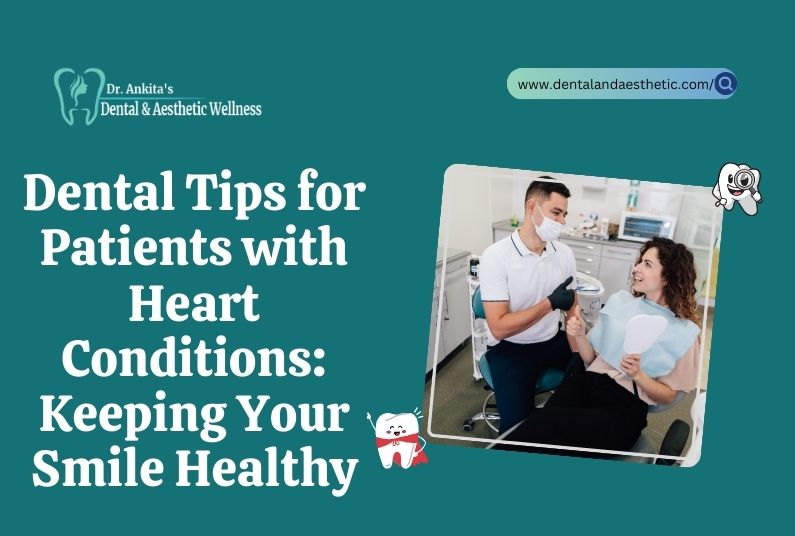Maintaining excellent oral health is essential for everyone, but it is particularly important for individuals with heart conditions. Research shows that there is a close connection between oral health and cardiovascular well-being. For patients with heart conditions, poor oral hygiene or untreated gum diseases can lead to severe complications, such as bacterial endocarditis, inflammation, and increased cardiovascular risks. For this reason, we at Dental and Aesthetic want to make sure you follow the proper dental care regimen to maintain the health of your smile and protect your heart.
In this article, we’ll cover some practical dental care tips tailored specifically for heart patients, so you can maintain optimal oral health without compromising your cardiovascular condition.
The Relationship Between Heart and Oral Health
Scientific studies suggest that gum diseases like periodontitis (a severe form of gum infection) can worsen pre-existing heart conditions. Gum infections allow harmful bacteria to enter the bloodstream, where they may contribute to plaque buildup in arteries and trigger inflammatory responses that affect heart function. Individuals with heart conditions are at higher risk of bacterial endocarditis, a serious infection of the heart lining, valves, or blood vessels caused by bacteria traveling from the mouth.
Moreover, conditions like atherosclerosis and high blood pressure can also be aggravated by oral health issues. Therefore, taking preventive steps through proper oral care is critical for heart patients to protect both their dental and cardiovascular health.
Dental Tips for Patients with Heart Conditions
Here are some essential dental care tips to help heart patients maintain a healthy smile while minimising cardiovascular risks.
- Brush and Floss Regularly
The first line of defence against tooth decay and gum disease is a regular oral hygiene regimen.
. Make sure to clean your teeth gently but thoroughly to avoid gum irritation.Brush twice a day using fluoride toothpaste and a soft-bristled toothbrush.
- To get rid of food particles and plaque accumulation between teeth that your toothbrush might not be able to reach, floss at least once every day.
Maintaining proper oral hygiene will help prevent bacterial growth, which is essential for minimising risks to your heart health.
- Use an Antibacterial Mouthwash
Patients with heart conditions benefit from using antibacterial or antiseptic mouthwashes that help reduce plaque and bacteria in the mouth. Rinsing with these mouthwashes can reduce the chance of oral bacteria entering the bloodstream and prevent illnesses. However, it’s important to consult with your dentist or cardiologist to find a suitable product that won’t interfere with your medications.
- Inform Your Dentist About Your Heart Condition
It’s important to let your dentist know about any recent surgeries, drugs, and heart conditions.
- Certain heart patients may require antibiotics before dental treatments to prevent bacterial infections like endocarditis.
- To make sure that treatments are stress-free and safe, your dentist can also modify the anaesthesia or procedure types based on your cardiovascular condition.
Sharing your medical history allows your dental team to provide personalised care that protects your heart while maintaining your oral health.
- Avoid Smoking and Alcohol
Both smoking and excessive alcohol consumption can damage your oral health and increase the risk of cardiovascular problems.
- Smoking weakens the immune system, making it harder for your body to fight off gum infections and increasing the risk of tooth loss.
- Alcohol can dry out your mouth, promoting bacterial growth, which may lead to gum inflammation or decay.
Quitting smoking and moderating alcohol intake will help protect both your heart and teeth.
- Stay on Top of Dental Check-Ups
Routine dental exams are essential for preventing and treating oral health problems before they get worse.. Schedule a dental check-up every 6 months or more frequently if advised by your dentist.
- Regular cleanings by a professional will aid in removing tartar and plaque, which are factors in gum disease.
- Additionally, routine examinations enable your dentist to keep an eye on your oral health and identify infection symptoms early, which is very important for heart patients.
- Manage Dry Mouth (Xerostomia)
Dry mouth is a side effect of many cardiac drugs, including beta-blockers and diuretics. The bacterial development that a dry mouth encourages can lead to gum disease and tooth decay.
- To keep your mouth hydrated, sip on lots of water throughout the day.
- Use sugar-free gum or saliva substitutes to stimulate saliva production.
- Inform your dentist about your medications so they can recommend specific products or treatments to manage dry mouth effectively.
- Monitor for Signs of Gum Disease
Heart patients should stay vigilant for early signs of gum disease, including:
- Red, swollen, or bleeding gums
- Persistent bad breath
- Loose teeth
- Receding gums
If you encounter any of these symptoms, get in touch with your dentist right once.
Early treatment of gum disease can lower your cardiovascular risks and stop it from getting worse.
- Healthy Diet for Teeth and Heart
Eating a balanced diet is essential for heart and dental health maintenance.
Sugar-rich foods and drinks should be avoided because they can cause tooth decay and gum disease.
- To promote your general well-being, concentrate on eating a diet high in fruits, vegetables, healthy grains, and lean meats.
- Incorporate meals rich in calcium and vitamin D to fortify bones and teeth.
- A diet high in heart-healthy foods is beneficial to your entire body, including your teeth and gums.
Conclusion
An essential component of treating cardiac issues is maintaining your dental health. At Dental and Aesthetic, we believe in the holistic connection between oral and cardiovascular health. By following these tips—maintaining good hygiene practices, visiting the dentist regularly, and communicating openly with your healthcare providers—you can protect your smile and reduce your risk of heart-related complications.

